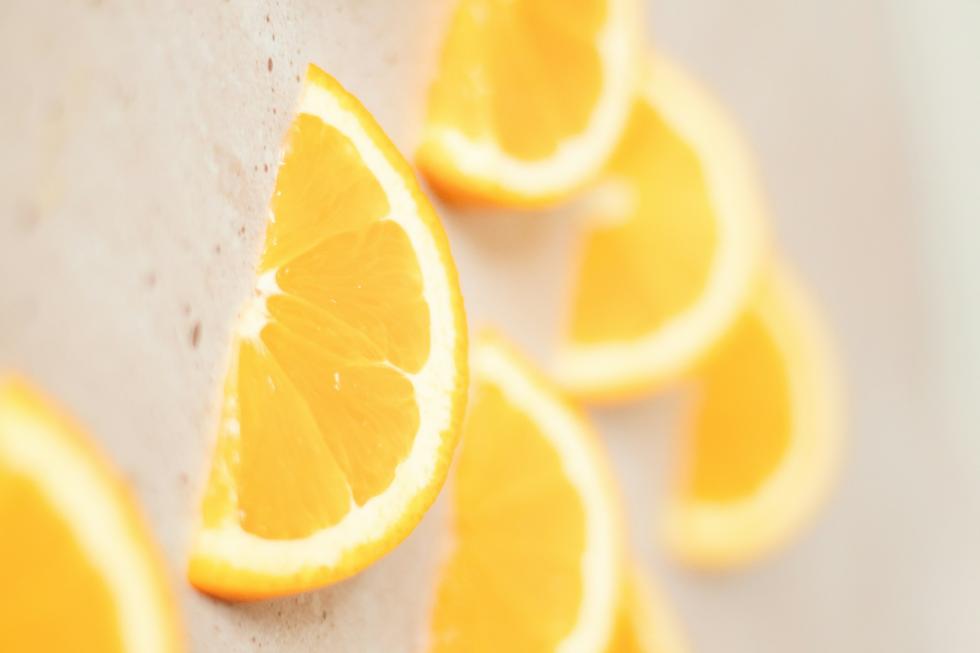Quick version
Vitamin C is a versatile vitamin that is important for several bodily functions:
- Boosts the immune system: Helps protect blood cells from oxidative stress.
- Promotes collagen production: Contributes to elastic and strong skin, joints, and blood vessels, as well as faster wound healing.
- Acts as an antioxidant: Neutralizes free radicals and prevents cell damage.
- Improves iron absorption: Enhances the uptake of iron from plant-based sources, which is especially important for those who do not eat meat.
- Skincare: Strengthens the skin against damage and is often used in Vitamin C serums for radiance and protection.
How much Vitamin C is needed?
- Adults: 95 mg (women) and 110 mg (men) per day.
- Pregnant and breastfeeding women: 105–155 mg per day.
- Smokers: About 40 mg extra per day.
Foods rich in Vitamin C
- Fruits: Oranges, kiwis, strawberries.
- Vegetables: Bell peppers, broccoli, spinach.
- Other: Rose hips and parsley.
For those who don’t eat meat
Vitamin C enhances the absorption of non-heme iron from plant-based foods such as legumes and whole grains, which helps prevent iron deficiency. For best results, combine foods like lentils with bell peppers or oranges!
What is Vitamin C good for?
Several of the body's functions depend on Vitamin C. Here are five important ones to keep in mind:
- Vitamin C supports a strong immune system because it helps stimulate the production of blood cells and protects them against oxidative stress, which can occur when there is an imbalance between free radicals and antioxidants in the body.
- Vitamin C contributes to the formation of collagen, a protein that keeps the skin, joints, and blood vessels elastic and strong. When the body tries to repair tissue damage, such as wounds, collagen is needed to strengthen and restore the skin’s structure.
- Vitamin C is an antioxidant that protects against free radicals, which can damage cells and contribute to aging and disease.
- Vitamin C helps the body absorb from non-heme iron sources, which are plant-based foods such as legumes, grains, nuts, and vegetables. This is especially important for people who do not eat meat and can thus help prevent iron deficiency.
- Vitamin C promotes collagen production, which helps protect the skin from sun damage and pollution. This makes Vitamin C a favorite in skincare. Many people use a Vitamin C serum, applied directly to the skin, to take advantage of the vitamin's antioxidant properties.
How much Vitamin C do we need per day?
According to Livsmedelsverket (the Swedish Food Agency), the recommended daily intake (RDI) of Vitamin C is as follows, varying by age, gender, and lifestyle:
- Adults: 95 mg for women and 110 mg for men.
- Pregnant women: 105 mg per day.
- Breastfeeding women: 155 mg per day.
- Smokers: About 40 mg more per day than the average, as smoking increases oxidative stress.
Getting enough Vitamin C is easy for most people who eat a varied diet, but deficiency can occur with poor dietary habits or certain medical conditions.
Foods rich in Vitamin C
Fruits and vegetables are abundant sources of Vitamin C. Here are some of the best sources:
- Fruits: Oranges, kiwis, strawberries, mangoes, papayas, and grapefruits.
- Vegetables: Bell peppers (especially red), broccoli, Brussels sprouts, spinach, and tomatoes.
- Other: Rose hips and parsley are exceptionally rich in Vitamin C and can be used as supplements.
Eating fresh produce is important because Vitamin C is heat-sensitive and easily destroyed during cooking.
How Vitamin C helps non-meat eaters absorb iron
Iron from plant-based sources, known as non-heme iron, is absorbed less efficiently by the body compared to heme iron from animal products. Vitamin C helps convert non-heme iron into a more absorbable form, improving the body's iron absorption. Combining foods like legumes, nuts, or whole grains with Vitamin C-rich foods such as bell peppers, citrus fruits, or broccoli is therefore an effective way to ensure sufficient iron intake and prevent iron deficiency.





















